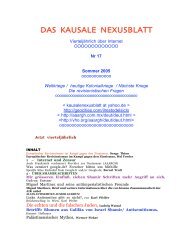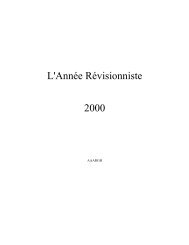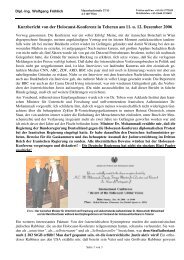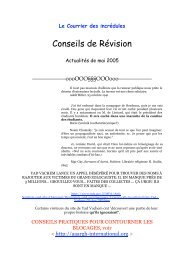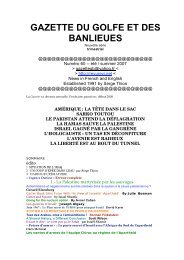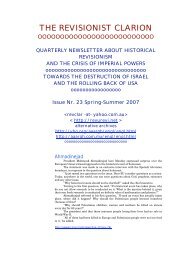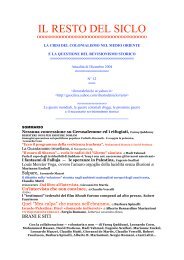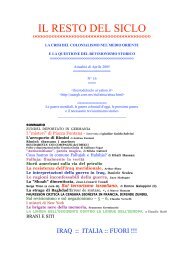hiver - Historical Revisionism by Vrij Historisch Onderzoek
hiver - Historical Revisionism by Vrij Historisch Onderzoek
hiver - Historical Revisionism by Vrij Historisch Onderzoek
Create successful ePaper yourself
Turn your PDF publications into a flip-book with our unique Google optimized e-Paper software.
——————————————————————> Conseils de révisions / <strong>hiver</strong> winter 2007<br />
Mr. Steinitz said professors should be free to go to participate in any conference they want,<br />
providing it is focused on legitimate academic exploration.<br />
"At a conference at which things are discussed, that's one thing. At a conference which is<br />
announced as a propaganda exercise for something that is blatantly false, you can't give any<br />
credibility."<br />
Mr. Steinitz declined to suggest how the university should handle the situation, and instead<br />
said he was satisfied so many members of the faculty signed the letter.<br />
But the embattled Mr. Dossa also has his defenders.<br />
The most vocal has been Phil Milner, who teaches English at the university and penned an<br />
editorial in a Halifax newspaper defending his colleague.<br />
"I would say the trip to Iran was ill-advised, but nonetheless, he went there and gave the<br />
kind of paper political scientists give," said Mr. Milner.<br />
"I think academics should know better that academic freedom is important.... Some very<br />
good people, half the faculty, did not sign that petition and did not sign it for good reason."<br />
Mr. Milner said the university's president gave a knee-jerk reaction and should have more<br />
carefully considered what was at stake before criticizing Dossa.<br />
Globe and Mail, Toronto, 22 12 2006<br />
http://www.theglobeandmail.com/servlet/story/RTGAM.20061222.wdossa1222/BNStory/National/home<br />
Mr. Dossa participated but failed entirely to "confront and challenge repugnant views directly". He<br />
kept his mouth shut.<br />
NO JOKE<br />
Tehran's Holocaust lesson<br />
Denying history and reality<br />
Anne Applebaum | Special to the Washington Post<br />
Last week, the Iranian Foreign Ministry held an international conference. Nothing unusual in<br />
that: Foreign ministries hold conferences, mostly dull ones, all the time. But this one was different.<br />
For one, "Review of the Holocaust: Global Vision" dealt with history, not current politics.<br />
Instead of the usual suspects -- deputy ministers and the like -- the invitees seem to have included<br />
David Duke, a former Ku Klux Klan leader; Georges Theil, a Frenchman who has called the Holocaust<br />
"an enormous lie"; and Fredrick Toeben, a German-born Australian whose specialty is the denial of<br />
Nazi gas chambers.<br />
The guest list was selective: No one with any academic eminence, or indeed any scholarly<br />
credentials, was invited. One Palestinian scholar, Khaled Kasab Mahameed, was invited but then<br />
barred because he holds an Israeli passport -- and also perhaps because he, unlike other guests,<br />
believes the Holocaust really did happen.<br />
In response, Europe, the United States and Israel expressed official outrage. The German<br />
government, to its credit, organized a counter-conference. Still, many have held their distance,<br />
refusing to be shocked or even especially interested. After all, the Holocaust ended more than six<br />
decades ago. Since then, victims of the Holocaust have written hundreds of books, and scholarship on<br />
the Holocaust has run into billions of words. There are films, photographs, documents, indeed whole<br />
archives dedicated to the history of the Nazi regime. We all know what happened. Surely Iran's denial<br />
cannot be serious.<br />
Unfortunately, Iran is serious -- or at least Iran's president, Mahmoud Ahmadinejad, is deadly<br />
serious: Holocaust denial is his personal passion, not just a way of taunting Israel, and it's based on his<br />
personal interpretation of history. Earlier this year he lauded the great achievements of German<br />
culture and lamented that "the propaganda machinery after World War II has been so colossal that (it)<br />
has caused some people to believe that they are the guilty party." Such views hark back to the 1930s,<br />
when the then-shah of Iran was an admirer of Hitler's notion of the "Aryan master race," to which<br />
Persians were said to belong. Ahmadinejad counts as a mentor an early Muslim revolutionary who was<br />
heavily influenced <strong>by</strong> wartime Nazi propaganda. It shows.<br />
Of course, Holocaust denial also has broader roots and many more adherents in the Middle<br />
East, which may be part of the point, too: Questioning the reality of the Holocaust has long been<br />
another means of questioning the legitimacy of the state of Israel, which was created <strong>by</strong> the United<br />
Nations in response to the Holocaust, and which has incorporated Holocaust history into its national<br />
— 76 —



